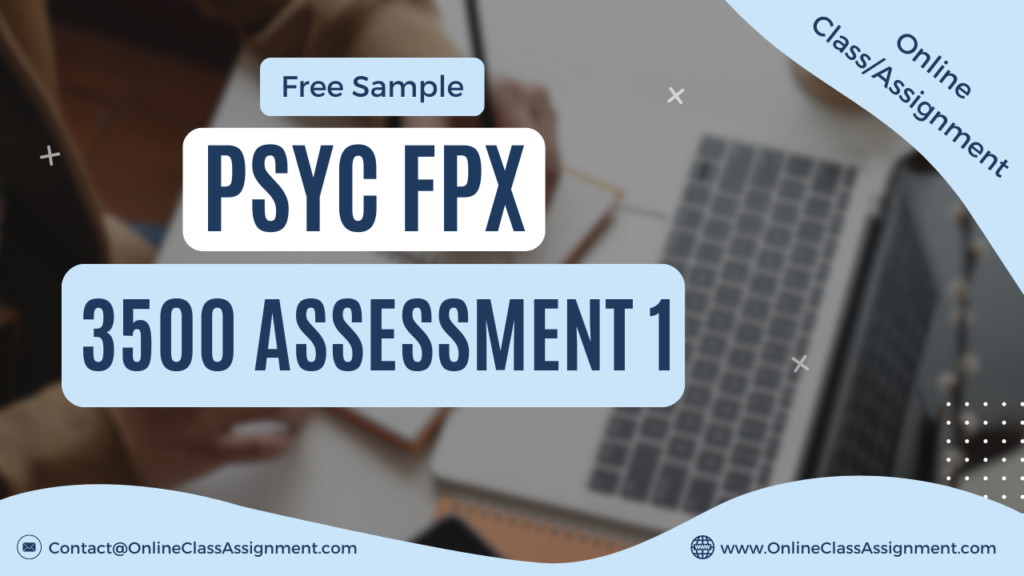
PSYC FPX 3500 Assessment 1 Popular Versus Scholarly Sources
Student Name
Capella University
PSYC FPX 3500 Learning and Cognition
Prof. Name
Date
Popular Versus Scholarly Sources Worksheet
Selected Topic: The relationship between trauma and Episodic Memory.
Full Reference for the Source:
NICABM. (2019, May 19). How trauma hijacks a client’s memory, with Peter Levine. YouTube. Retrieved October 10, 2022, from https://youtu.be/3woCwkBcKwk
Summary of the Content:
Peter Levine discussed the impact of trauma on memory, particularly episodic memory. Traumatic experiences can significantly influence episodic memories, leading to persistent recollections or suppression as a protective mechanism, potentially causing confusion and dissociation.
Peer-Reviewed Journal Articles:
- Brewin, C. R. (2014). Episodic memory, perceptual memory, and their interaction: Foundations for a theory of posttraumatic stress disorder. Psychological Bulletin, 140(1), 69-97. https://doi.org/10.1037/a0033722
- Dolcos, F., Iordan, A. D., Kragel, J., Stokes, J., Campbell, R., McCarthy, G., & Cabeza, R. (2013). Neural correlates of opposing effects of emotional distraction on working memory and episodic memory: An event-related FMRI investigation. Frontiers in Psychology, 4, 293-293. https://doi.org/10.3389/fpsyg.2013.00293
- Forest, M., & Blanchette, I. (2018). Memory for neutral, emotional and trauma-related information in sexual abuse survivors. European Journal of Psychotraumatology, 9(1), 1476439-10. https://doi.org/10.1080/20008198.2018.1476439
PSYC FPX 3500 Assessment 1 Popular Versus Scholarly Sources
Relevance of Articles:
- The first article investigates PTSD theories and memory systems, directly pertinent to the topic.
- The second article explores neural mechanisms underlying emotional memory and working memory after trauma.
- The third article examines trauma’s impact on episodic memory in sexual abuse survivors, offering insights into long-term effects.
Comparison and Contrast:
- The popular source’s assertion aligns with Brewin (2014), which indicates enhanced memory for traumatic events.
- However, Dolcos et al. (2013) suggest emotional distracters may impair episodic memory, potentially conflicting with the popular source.
- Forest and Blanchette (2018) validate the popular source’s information, confirming trauma’s impact on episodic memory.
Questions Raised:
Can specific event memories ever be fully restored despite gaps formed due to trauma?
Application to the Real World:
Understanding the link between trauma and episodic memory promotes empathy and patience, particularly in legal contexts where memory reliability influences judgments.
Self-Evaluation
| Criterion | Level | Rationale |
|---|---|---|
| Summarizes the content of a popular media source | Distinguished | Clearly summarized the content of the media source that relates to the topic. |
| Identifies three peer-reviewed journal articles | Distinguished | Three peer-reviewed journal articles were provided with a summary of their relevancy and APA format. |
| Compares and contrasts information with peer-reviewed articles | Distinguished | Clearly compared and contrasted the media source with peer-reviewed articles, demonstrating validity. |
| Describes real-world application of the topic | Distinguished | Provided a comprehensive description of how the topic can be applied, with relevant examples. |
References
Brewin, C. R. (2014). Episodic memory, perceptual memory, and their interaction: Foundations for a theory of posttraumatic stress disorder. Psychological Bulletin, 140(1), 69-97. https://doi.org/10.1037/a0033722 Dolcos, F., Iordan, A. D., Kragel, J., Stokes, J., Campbell, R., McCarthy, G., & Cabeza, R. (2013). Neural correlates of opposing effects of emotional distraction on working memory and episodic memory: An event-related FMRI investigation. Frontiers in Psychology, 4, 293-293. https://doi.org/10.3389/fpsyg.2013.00293 Forest, M., & Blanchette, I. (2018). Memory for neutral, emotional and trauma-related information in sexual abuse survivors. European Journal of Psychotraumatology, 9(1), 1476439-10. https://doi.org/10.1080/20008198.2018.1476439
PSYC FPX 3500 Assessment 1 Popular Versus Scholarly Sources
Get Capella University Free BS Psychology Samples
BIO FPX 1000
COM FPX 1150
HIM FPX 4610
HIS FPX 1150
HUM FPX 1150
PSYC FPX 1000
PSYC FPX 2200
PSYC FPX 2300
